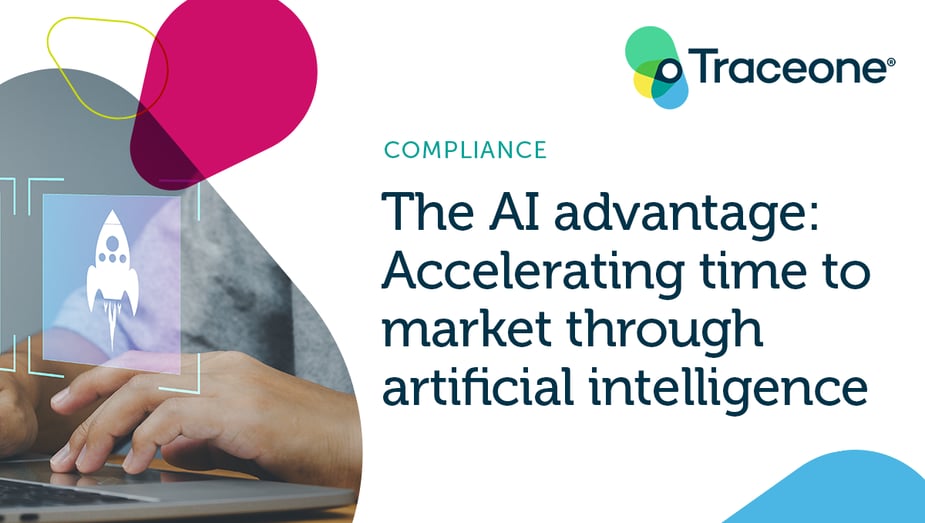
- Home
- PLM & Compliance Blog
- The AI advantage: Accelerating time to market through artificial intelligence
The AI advantage: Accelerating time to market through artificial intelligence
|
Product Lifecycle Management
|
Regulatory
Posted By:
Trace One
When it comes to new product development and introduction (NPDI), time to market is top of mind.
Decreasing the time horizon from ideation to production and distribution unlocks several competitive advantages. By beating their peers to market, manufacturers position themselves as innovators. They also save on costs, especially for longer projects. Ultimately, the quicker the time to market, the faster you gain access to revenue.
But it isn’t just a matter of velocity. It’s also about getting products right the first time. That helps avoid costly recalls and damage to brand trust.
Manufacturers are always looking for ways to speed up time to market while mitigating risk. Integrated product lifecycle management (PLM) solutions have revolutionized the NPDI process, and the emergence of advanced AI tools represents new possibilities. They’re making an impact across all kinds of industries and disciplines, but their potential for accelerating time to market is especially powerful in manufacturing.
Time-to-market challenges: Complexity and collaboration
There are plenty of organizational obstacles that slow down the NPDI process and hinder time to market. These roadblocks can be especially difficult for enterprise manufacturers and international producers.
Enterprises typically require collaboration across large, distributed teams. Even though they span different disciplines and regions, teams still need access to a single source of truth. Siloed systems often lead to difficulties in finding and leveraging information. Meanwhile, extensive approval flows rely on multiple parties across an organization.
If a manufacturer operates internationally, it faces additional challenges from global supply chains, regional regulations, and more.
How AI will speed time to market
AI is especially useful for enterprise and international manufacturers because it does what humans do worst: assembling and interpreting data from disparate sources at high speed, on a massive scale.
AI algorithms are more powerful when they train on large data sets. As a result, massive, information-rich ecosystems like PLMs provide the perfect environments for AI features to flourish.
Backed by extensive and readily available data, AI has several potential applications that will help speed time to market.
- Natural language queries
With the emergence of generative AI, natural language processing has undergone a quantum leap. That can make the query process much simpler and faster.
Instead of tweaking search parameters and filters to yield the best results, users will just input a query in natural language. AI-enabled answer bases can reduce drag across the entire NPDI process by eliminating time-consuming manual searches. - Image-based document processing
Manufacturers frequently source product and substance information from documents like safety data sheets that might arrive in different digital formats. AI algorithms are especially good at reconstructing information from images and documents—no matter the format.
They have the capability to extract, compile, and structure that information into the proper taxonomy for a PLM system or other tool. By eliminating the need for time-consuming manual inputs on substances, supplier information, or regulations, AI will save teams time and transform documents into functional data faster. - Disruption detection and alerts
Supply chain disruptions are potentially disastrous for manufacturers, and the increasingly global economy means that broad interconnectivity is the norm. But AI is especially effective at paying attention to large data sets and tracking changes as they occur.
With the right training, AI algorithms could gather and interpret data points that correlate with regional disruptions like disasters and regulatory changes, then push alerts to manufacturers so they have time to react. Automated alerts could help minimize disruption-based time-to-market delays. - Automated formulation
One of the most exciting aspects of AI is its ability to combine and recombine information into usable outputs. Using natural language inputs, a stakeholder could suggest target product properties. By leveraging the vast data stores available through PLM systems, the algorithm could assemble formulas based on available substance information, supply chain availability, regulatory frameworks, and more.
From there, the user could alter their prompt to optimize for cost, stability, availability of materials, or any other outcome, accelerating the formulation and optimization process—and ultimately time to market. It represents a potential revolution in agile R&D.
Anticipating AI in PLM systems
Mitigating risk and speeding time to market across complex networks—from the supply chain to regulatory frameworks—is a foundational challenge for manufacturers. By automating tasks best suited to AI, you can minimize technical work and focus on the conceptual and collaborative aspects of NPDI. That will only accelerate time to market.
Trace One, with its forethinking innovation approach, is taking concrete steps to include this technology in its PLM solutions to complement the data-rich ecosystem, bringing the next generation of product development tools in the hands of manufacturing organizations around the world.
This technology is still maturing, but it’s an exciting time. One thing is certain: Capitalizing on AI will be the key to velocity, and velocity leads to innovation, savings, and success.
